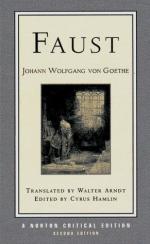“Kuehn
is das Muehen,
Herrlich
der Lohn!
Und
die Soldaten
Ziehen
davon.”
Literally:
Bold
is the endeavor,
Splendid
the pay!
And
the soldiers
March
away.
This Mr. Hayward translates:—
Bold
the adventure,
Noble
the reward—
And
the soldiers
Are
off.
For there are few things which may not be said, in English, in a twofold manner,—one poetic, and the other prosaic. In German, equally, a word which in ordinary use has a bare prosaic character may receive a fairer and finer quality from its place in verse. The prose translator should certainly be able to feel the manifestation of this law in both languages, and should so choose his words as to meet their reciprocal requirements. A man, however, who is not keenly sensible to the power and beauty and value of rhythm, is likely to overlook these delicate yet most necessary distinctions. The author’s thought is stripped of a last grace in passing through his mind, and frequently presents very much the same resemblance to the original as an unhewn shaft to the fluted column. Mr. Hayward unconsciously illustrates his lack of a refined appreciation of verse, “in giving,” as he says, “a sort of rhythmical arrangement to the lyrical parts,” his object being “to convey some notion of the variety of versification which forms one great charm of the poem.” A literal translation is always possible in the unrhymed passages; but even here Mr. Hayward’s ear did not dictate to him the necessity of preserving the original rhythm.
While, therefore, I heartily recognize his lofty appreciation of Faust,—while I honor him for the patient and conscientious labor he has bestowed upon his translation,—I cannot but feel that he has himself illustrated the unsoundness of his argument. Nevertheless, the circumstance that his prose translation of Faust has received so much acceptance proves those qualities of the original work which cannot be destroyed by a test so violent. From the cold bare outline thus produced, the reader unacquainted with the German language would scarcely guess what glow of color, what richness of changeful life, what fluent grace and energy of movement have been lost in the process. We must, of course, gratefully receive such an outline, where a nearer approach to the form of the original is impossible, but, until the latter has been demonstrated, we are wrong to remain content with the cheaper substitute.
It seems to me that in all discussions upon this subject the capacities of the English language have received but scanty justice. The intellectual tendencies of our race have always been somewhat conservative, and its standards of literary taste or belief, once set up, are not varied without a struggle. The English ear is suspicious of new metres and unaccustomed forms of expression: there are critical detectives on the track of every author, and a violation of the accepted canons is followed by a summons to judgment. Thus the tendency is to contract rather than to expand the acknowledged excellences of the language.[J]




